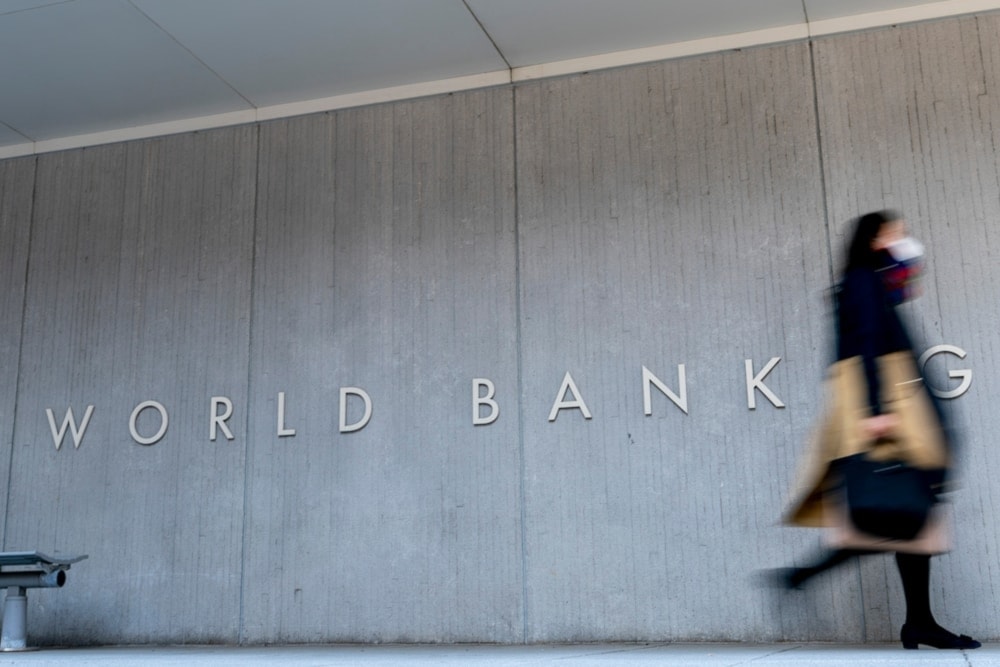World Bank moves Russia to high-income countries class
The bank announced that Russia, Bulgaria, and Palau, would be moved from upper-middle income to high-income categories.
-

The World Bank building is seen on April 5, 2021 in Washington, US. (AP)
According to the World Bank's new report on Monday, Russia has been moved from the upper-middle income level to the high-income level category.
"This year, three countries - Bulgaria, Palau, and Russia - moved from the upper-middle income to the high-income category," the bank announced.
Russia's economic activity was impacted by a significant rise in military activities in 2023. The study also cited a revival in commerce (+6.8%), the financial sector (+8.7%), and construction (+6.6%) as drivers of growth.
"These factors led to increases in both real (3.6%) and nominal (10.9%) GDP, and Russia's Atlas GNI per capita grew by 11.2%," according to the report.
West loses $257bln on trade restrictions with Russia
Importers from hostile nations received $256.5 billion less of Russian products, while Russia exported these commodities to other countries and profited by over $31 billion, Sputnik calculated based on open data.
Trade data show that Russian exports to unfriendly nations were uneven: certain commodities increased, while others decreased. Russia's exports increased compared to pre-sanctions levels, with enterprises earning an additional $31 billion from trade with friendly nations, according to Federal Customs Service statistics.
Western importers were primarily undersupplied with Russian minerals ($107 billion), jewels ($38 billion), and metals ($21 billion).
Russia has often said that it is willing to trade with friendly states in the aftermath of Western economic sanctions, warning that these restrictive measures will backfire, causing inflation and a cost-of-living problem.
In January-February, commerce between Russia and China increased by 9.3%, with Russia's exports reaching $20 billion. Vladimir Putin and Xi Jinping earlier announced aiming to double bilateral trade, achieving their target in November 2023.
US dominance effort doomed as nations pursue independent paths: Lavrov
Russian Foreign Minister Sergey Lavrov said last month that Washington's efforts to sustain its global dominance through political maneuvers are destined to fail, given the increasing number of countries opting for autonomous foreign policies.
"There is no doubt that this course of maintaining hegemony at all costs is doomed to failure. Even if in the foreseeable future the US remains one of the world's centers, and this is likely to be the case, it does not mean that this will happen within the framework of preserving the US-centered world order," Lavrov said at the Primakov Readings forum in Moscow.
The top diplomat also noted that a growing number of countries in Eurasia, Asia-Pacific, the Middle East, Africa, and Latin America are increasingly pursuing independent foreign policy paths, which cannot be overlooked. He added that these countries are gradually freeing themselves from Western influence.
"The outline of a more equitable, multipolar, and polycentric architecture is taking shape before our eyes. And this objective process has accelerated, noticeably accelerated with the start of the special military operation in Ukraine in 2022," Lavrov said.
Lavrov highlighted in early June that the expansion of BRICS serves as evidence of the ongoing formation of a multipolar world order, where emerging political centers advocate for equality and diversity. This trend persists despite the efforts of the US and its allies to maintain their "elusive dominance."

 3 Min Read
3 Min Read










